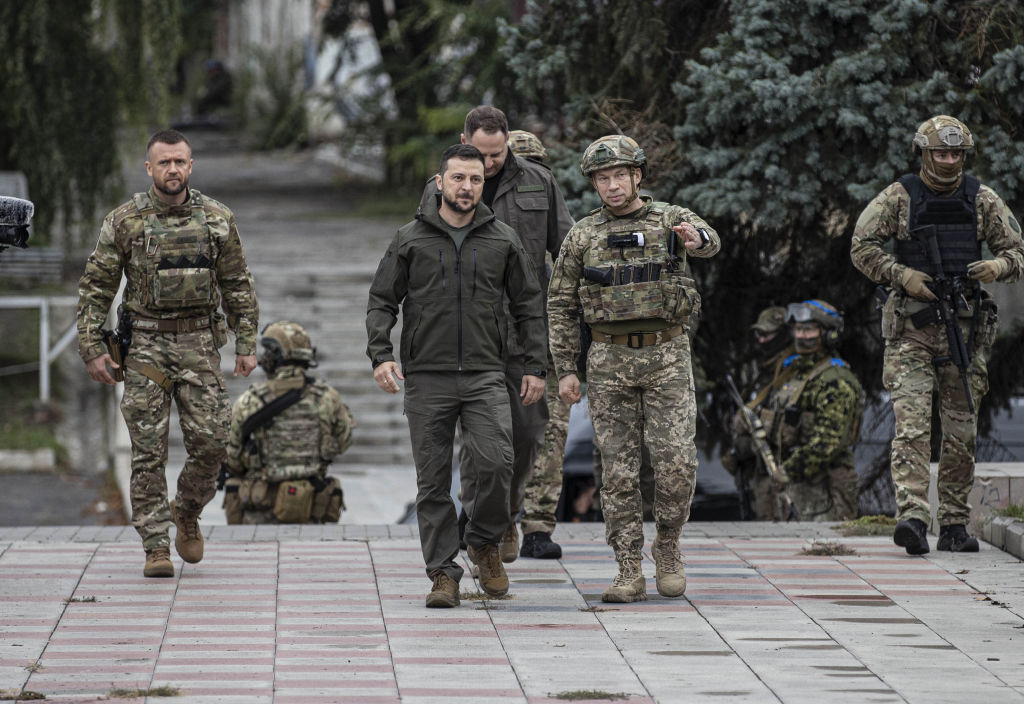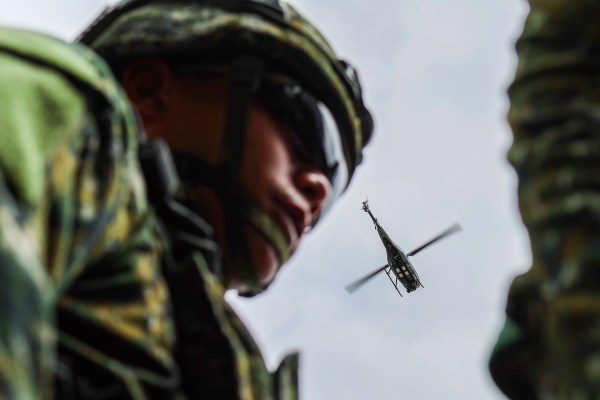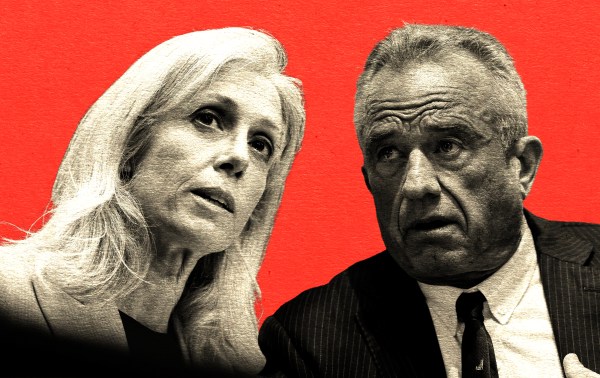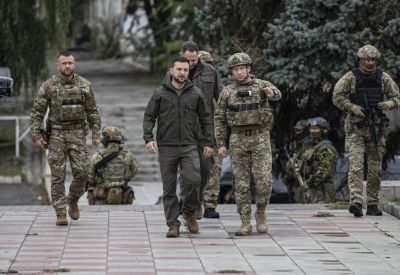Happy Monday! Friday was longtime Dispatch staffer (and onetime TMD co-author) Andrew Egger’s last day at the company, as he is returning to The Bulwark this week to be their White House correspondent.
We’d like to thank him for all his work getting The Dispatch off the ground these last four-and-a-half years, and we wish him nothing but the best. He will be missed—but not at this morning’s editorial meeting, where he’d probably be bleating about his Kansas City Chiefs’ back-to-back Super Bowl wins.
Quick Hits: Today’s Top Stories
- Israeli Prime Minister Benjamin Netanyahu ordered the Israel Defense Forces (IDF) on Friday to produce plans to evacuate the civilian population in Rafah, a city in southern Gaza along the border with Egypt, and destroy the remaining Hamas battalions located there. It also executed an overnight raid in the city on Monday, rescuing two Israeli hostages abducted by Hamas on October 7 in an operation that reportedly killed dozens of Palestinians. Rafah’s population has ballooned to more than a million as approximately half of the population of Gaza has fled to the city. U.S. officials have publicly opposed an invasion of Rafah, and President Joe Biden told Netanyahu on a call Sunday that an operation shouldn’t proceed without a plan to keep civilians safe. Netanyahu, however, defended the plans on Sunday, telling ABC News, “Those who say that under no circumstances should we enter Rafah are basically saying, ‘Lose the war. Keep Hamas there.’” Egypt has reportedly threatened to suspend its peace treaty with Israel if the IDF deploys ground forces in Rafah.
- The IDF announced on Saturday the discovery of a Hamas communications and intelligence center in a tunnel underneath the United Nations Relief Works Agency’s (UNRWA) headquarters in Gaza City. The center appeared to be using electricity from the UNRWA building, according to the IDF. Philippe Lazzarini, UNRWA’s commissioner-general, said Saturday that the agency “did not know what is under its headquarters in Gaza” and that when there’s no active conflict, UNRWA inspects its facilities every quarter. The last inspection was in September 2023, according to Lazzarini.
- Ukrainian President Volodymyr Zelensky continued to reshuffle military leadership over the weekend, appointing Lt. Gen. Oleksandr Pavliuk as commander of Ukraine’s ground forces on Sunday. Pavliuk took over from Col. Gen. Oleksandr Syrskyi, whom Zelensky promoted to commander in chief of Ukraine’s armed forces last week, replacing Gen. Valerii Zaluzhnyi following months of speculation. Meanwhile, Russian forces launched a barrage of drone attacks in cities and regions throughout Ukraine over the weekend. One strike in the city of Kharkiv hit an oil depot, starting a fire that killed seven people including two parents and their three children, according to local officials.
- Supporters of Pakistani opposition leader Imran Khan protested throughout Pakistan over the weekend, claiming last week’s elections were rigged. Independent candidates aligned with Khan’s Pakistan Tehreek-e-Insaf (PTI) party won the most seats in the country’s parliament, but no party secured a majority—though PTI officials claimed that some seats had been “falsely changed.” Khan, who’s currently in jail, also claimed victory in a speech that used an AI version of his voice. The other two major parties, Pakistan Muslim League-Nawaz and the Pakistan Peoples Party, held meetings over the weekend on potentially forming a coalition government.
- Venezuela has deployed additional military forces and equipment close to its border with Guyana, according to satellite images released on Friday. The move escalates the risk of war between the two countries over Essequibo, a disputed region claimed by Venezuela but administered by Guyana, and oil-rich waters off Essequibo’s coast.
- Defense Secretary Lloyd Austin—who was diagnosed with prostate cancer late last year—was transported to Walter Reed National Military Medical Center on Sunday afternoon for symptoms related to an “emergent bladder issue.” By Sunday evening, the Pentagon announced that Austin had transferred the duties of the office to Deputy Secretary of Defense Kathleen Hicks. Austin faced sharp criticism last month for not notifying the Biden administration—or the president himself—of his previous hospitalizations in December or January.
- Rep. Matt Rosendale, a Montana Republican, launched a bid on Friday to unseat Democratic Sen. Jon Tester, joining Tim Sheehy in the state’s Republican primary scheduled for June. Sheehy, a wealthy veteran backed by the Republican Senatorial Committee, was also endorsed by former President Donald Trump on Friday.
- Former Maryland Gov. Larry Hogan, a Republican, announced a bid on Friday for the U.S. Senate seat soon to be vacated by retiring Democratic Sen. Ben Cardin. Hogan is popular in Maryland and a vocal Trump critic, making him a strong candidate for the GOP in the blue state. “I am running for the United States Senate—not to serve one party—but to stand up to both parties, fight for Maryland, and fix our nation's broken politics,” Hogan said on Friday. He stepped down as a co-chair of No Labels—the group exploring an independent run for president—last month.
- Rep. Mike Gallagher, a Wisconsin Republican, announced on Friday that he won’t seek reelection in November. The 39-year-old is currently serving his fourth term and chairs the House committee on competition with China. “When I first ran for Congress, I promised to treat my time in office as a high-intensity deployment,” Gallagher said in a statement on Saturday. “Congress is no place to grow old.” He was one of four House Republicans to vote against the impeachment of Homeland Security Secretary Alejandro Mayorkas last week, and he joins a wave of lawmakers not seeking reelection this cycle. A pro-Trump Republican political consultant had reportedly been mulling a primary challenge to Gallagher.
- The Kansas City Chiefs defeated the San Francisco 49ers in Super Bowl LVIII last night, squeaking out a 25-22 win in overtime and marking a team’s first back-to-back NFL championship victories since the New England Patriots in 2004 and 2005. Quarterback Patrick Mahomes was named Super Bowl MVP.
Zelensky’s Mid-War Changes

In a tweet Thursday announcing the firing of Valerii Zaluzhnyi, Ukraine’s top army general, Ukrainian President Volodymyr Zelensky shared a picture in which he and Zaluzhnyi were shaking hands and smiling amicably. “I met with General Valerii Zaluzhnyi,” Zelensky wrote. “I thanked him for the two years of defending Ukraine. […] I proposed to General Zaluzhnyi to remain part of the team.”
Though it’s not yet clear whether the man who’s led Ukraine’s armed forces since the beginning of Russia’s invasion almost two years ago will, in fact, “remain part of the team,” the reshuffling was a long time coming as Kyiv reaches yet another turning point in the war. In the capital, the country’s political leadership is grappling with tense civil-military relations and considering a new conscription bill. On the battlefield, amid diminishing manpower and crippling ammunition shortages caused by dwindling U.S. aid, Ukraine’s forces seem on the cusp of losing the battle for a town that has resisted Russian occupation for almost a decade. Despite a glimmer of hope provided by renewed European support, Ukraine’s outlook remains bleak as it returns to a defensive posture.
Zaluzhnyi’s ouster seemed imminent, as private disagreements with Zelensky about the state of the war became increasingly public over the past several weeks. Late last year, the two clashed over the extent to which the summer’s counteroffensive—which didn’t secure any significant breakthroughs in Russia’s dug-in defensive lines—should be considered a failure. Zaluzhnyi declared in the pages of The Economist that the war was functionally in a “stalemate,” a claim Zelensky contradicted just days later in an interview with NBC News.
The two were also at odds over the prudence of a politically unpopular conscription plan. The Ukrainian government is currently considering a draft proposal for a mass mobilization bill, expanding who is eligible to be drafted and punishing draft dodgers. Zelensky has suggested it’s incumbent on the military to prove the necessity of mass mobilization, something he says the country’s diminishing coffers may not be able to cover. Zaluzhnyi has said finding a solution to the military’s manpower shortfall—the Washington Post reported last week that the country is facing a critical shortage of infantry soldiers—was the responsibility of civilian leadership. “We must acknowledge the significant advantage enjoyed by the enemy in mobilizing human resources and how that compares with the inability of state institutions in Ukraine to improve the manpower levels of our armed forces without the use of unpopular measures,” Zaluzhnyi argued in a CNN op-ed earlier this month, without suggesting an alternative to an unpopular mobilization of potentially hundreds of thousands of men.
In a video address on Thursday, Zelensky finally confirmed what had been suspected for weeks: He’d be replacing Zaluzhnyi with General Oleksandr Syrskyi, the commander of Ukraine’s ground forces. Syrskyi is an experienced commander best known as the mastermind behind the defense of Kyiv early in the war and the retaking of Kharkiv in September 2022.
Syrskyi’s predecessor was widely beloved by rank-and-file troops, so much so that some have speculated his ouster may have been Zelensky’s effort to sideline a potential political rival. Syrskyi, on the other hand, is known among Ukrainian troops as “Butcher,” a moniker he picked up during his time leading the monthslong defense of Bakhmut. The taking of the town last spring, of much symbolic but little strategic value to Kyiv, was one of Russia’s major victories in the war and came at great cost to Ukrainian troops. “There’s a general feeling in the military that he does not care for the loss of troops’ lives,” Dmitri Alperovitch, the chairman and founder of the Silverado Policy Institute, told TMD. “Fairly or unfairly, that’s the feeling that they’ve got. So his appointment will not help morale that has been trending downwards for quite some time. So while Zelensky unquestionably has the right to pick the commander he trusts, there were probably better choices out there that could have had less of a negative impact on the military.”
Zaluzhnyi isn’t the only high-level official to be shown the door in recent months—though under very different circumstances. Both before and during the war, the military and other government ministries have struggled to combat graft. In September, the minister of defense, Oleksii Reznikov, resigned after Zelensky signaled plans to remove him. Though Reznikov was not personally suspected of corruption, such charges plagued the ministry during his tenure. Investigations have continued: The Ukrainian security service late last month accused two top defense officials of stealing funds meant to procure mortar shells in 2022.
“It’s very hard, because we know Ukraine is a corrupt country, like many others in the region,” said Iulia Joja, the director of the Black Sea program at the Middle East Institute. “And the problem with the military per se is a bit deeper. [...] We also have to remind ourselves that Ukraine is one of the few countries around the world in which you have a very strong civil society that is actually begging the West for more checks, and more control over corruption and transparency, because they want their country and they want to work hard to make their country transparent and with less corruption. So we have to give them credit there.”
Amid this tumult, the war rages on at the frontlines. The town of Avdiivka—just north of the city of Donetsk, as shown in the map below from the Institute for the Study of War and Critical Threats Project—has been on the frontline of Ukraine’s conflict with Russia since 2014, when fighting began between Ukrainian forces and Russia-backed separatists in the eastern region of Ukraine. After years of resistance and, in recent months, a taxing Ukrainian defense against a Russian onslaught, the city is poised to fall to Moscow’s forces. Using what one Ukrainian sniper described as “meat assaults,” Russia has deployed masses of soldiers as expendable cannon fodder to wear down Ukrainian defenses, highlighting Ukraine’s own shortage of manpower.

“The enemy is pressuring from all directions,” Avdiivka’s mayor said Thursday. “They are storming with very numerous forces.” The town’s fall would be the most significant change to the contours of the frontline in months and would only solidify Russia’s occupation of the eastern Donbas region. Russian President Vladimir Putin would likely hold it up as an important symbol ahead of Russian presidential elections in March.
Complicating the Ukrainian efforts is the ever-waning supply of U.S. materiel, the final disbursement of which came at the end of 2023. After the collapse last week of a deal in the Senate that would have linked border security provisions with foreign aid—including some $60 billion in aid for Ukraine—the Senate pivoted to a package composed exclusively of foreign aid, untied to immigration reform. Lawmakers moved closer to advancing the new bill on Sunday, but final passage may still be days away. Even if the Senate manages to advance it, the fate of additional Ukraine aid in the House is uncertain. Speaker Mike Johnson has suggested he’ll separate the Ukraine funding from aid to Israel and the Indo-Pacific and push for individual votes on aid to each region.
Meanwhile, the European Union has stepped up its support, unanimously passing a $54 billion aid package for Ukraine, over the objections of Hungarian Prime Minister Viktor Orbán, to be disbursed over the next three years. That money, though, is not meant to fund the purchase of arms and ammunition, but rather to help Ukraine make up its ever-expanding budget shortfall—to keep the lights on in government buildings in Kyiv where the war is being directed and pay civil servants, for example. “It sends a message to Putin that we are in for the long haul, just as he is,” Joja said.
Intra-EU debates about funding mechanisms have put additional military funding on hold, even as Germany’s chancellor, Olaf Scholz, traveled to the U.S. this week to try to hurry the U.S. package along. “Let’s not beat around the bush,” he said last week after meeting with President Joe Biden. “Support from the United States is indispensable for the question of whether Ukraine will be able to defend its own country.”
In the meantime, Ukraine has been rationing its limited supply of artillery and air defense munitions, even as Russian forces bear down. “We’ve also seen—as aid has bogged down […] that [Russia has] tried to make Ukraine consume their stockpiles, particularly of air defense systems,” Joja told TMD. “They’re very expensive and the Russians know they’re finite, and so they’re trying to target […] military factories,” not only to make Ukraine expend air defenses protecting them but to potentially destroy new weapons and ammunition Ukraine is producing.
In addition to rationing, Ukrainians are also making do with homegrown weapons, such as the relatively cheap first-person view (FPV) drones. Ukrainian troops have deployed in increasing numbers against Russian troops and their equipment, controlled from the safety of bunkers or trenches. But these are an imperfect substitute for heavy artillery and ammunition. “They’re very susceptible to electronic warfare, jamming, and challenges with munitions for those drones, because the drone itself is [not] useful unless you can attach a warhead to it, and they have some issues procuring those too,” Alperovitch told TMD, pointing out the shortage of artillery ammunition. “So it’s not really a phenomenal substitute.”
Worth Your Time
- Writing for the Wall Street Journal, University of Virginia sociologist Brad Wilcox argued—just in time for Valentine’s Day—that the “soulmate” view of love is wrong. “The problem with this model is that it offers a view of marital love that is hard to sustain—one focused on the ebb and flow of romantic feelings,” he wrote. “Seeing marriage this way is attractive on its face, because romance is so charming. But as an ideal, it can make it more difficult for husbands and wives to embrace a richer, more stable and ultimately more satisfying idea of marriage, beyond the me-first spirit of soulmate love. … For those seeking a soulmate, what matters is emotional skills and the ability to spark romantic or sexual chemistry. These qualities are supposed to put men and women on the path to what they see as the primary goods of marriage: intimacy, self-expression and self-fulfillment. The problem, of course, is that very few couples can maintain this romantic high. No one person, no one relationship, can give us great pleasure and great happiness all (or even most) of the time. Couples who embrace the soulmate model are often left disappointed by the real-world realities of love and marriage.”
Presented Without Comment
Associated Press: NATO Leader Says Trump Puts Allies at Risk by Saying Russia Can ‘Do Whatever the Hell They Want’
Speaking Saturday at a rally in Conway, South Carolina, Trump recalled how as president he told an unidentified NATO member that he would “encourage” Russia to do as it wishes in cases of NATO allies who are “delinquent.”
“‘You didn’t pay? You’re delinquent?’” Trump recounted saying. “‘No I would not protect you. In fact, I would encourage them to do whatever the hell they want. You gotta pay. You gotta pay your bills.’”
Also Presented Without Comment
Politico: White House Frustration With [Attorney General Merrick] Garland Grows
Joe Biden has told aides and outside advisers that Attorney General Merrick Garland did not do enough to rein in a special counsel report stating that the president had diminished mental faculties, according to two people close to the president, as White House frustration with the head of the Justice Department grows.
…
In recent weeks, President Biden has grumbled to aides and advisers that had Garland moved sooner in his investigation into former President Donald Trump’s election interference, a trial may already be underway or even have concluded, according to two people granted anonymity to discuss private matters.
Also Also Presented Without Comment
Forbes: Robert Kennedy Jr. Apologizes To His Family After [a Super PAC’s] Super Bowl Ad Copies JFK’s Famous Campaign
Toeing the Company Line
- Our fact-checker, Alex Demas, sat through Tucker Carlson’s two-hour interview with Vladimir Putin and called out some of the most significant falsehoods or half-truths.
- In the newsletters: Mike and Sarah recapped a very busy week for law and presidential politics in The Collision, the Dispatch Politics crew covered Democratic reaction to Special Counsel Robert Hur’s report, Nick argued (🔒) the bill has come due on Democrats neglecting voter concerns about Biden’s age, and Chris outlined (🔒) the political fallout for Biden from Hur’s report.
- On the podcasts: Jonah ruminated on the news of the week from an undisclosed location in the Caribbean, and on today’s Dispatch Podcast, Jamie hosts Chris Moody, a journalism professor at Appalachian State University, to discuss the career of Matt Drudge and the imprint he’s left on American news media.
- On the site over the weekend: Rachel Ferguson and Dylan Pahman argued Christian nationalism can’t make America Christian, Robert Bellafiore reflected on the 100th anniversary of George Gershwin’s “Rhapsody in Blue,” and Jessica Schurz explored the evolution of girlhood on display in the Mean Girls reboot.
- On the site today: Charlotte analyzes whether the U.S.’s response to Iranian-backed militias will deter Iran, and Seth Kaplan argues that America needs to restore a sense of community and cohesion at the local level.
Let Us Know
Who were you rooting for in the Super Bowl yesterday?








Please note that we at The Dispatch hold ourselves, our work, and our commenters to a higher standard than other places on the internet. We welcome comments that foster genuine debate or discussion—including comments critical of us or our work—but responses that include ad hominem attacks on fellow Dispatch members or are intended to stoke fear and anger may be moderated.
With your membership, you only have the ability to comment on The Morning Dispatch articles. Consider upgrading to join the conversation everywhere.